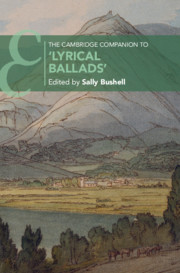Book contents
- The Cambridge Companion to ‘Lyrical Ballads’
- The Cambridge Companion to ‘Lyrical Ballads’
- Copyright page
- Dedication
- Contents
- Contributors
- Acknowledgements
- Chronology
- Abbreviations
- Introduction
- Part I Part and Whole
- Part II Subjects and Situations from Common Life
- Part III Feeling and Thought
- Part IV Language and the Human Mind
- Chapter 10 A ‘Radical Difference’
- Chapter 11 Awkward Relations: Poetry and Philosophy in Lyrical Ballads
- Part V A Global Lyrical Ballads
- Guide to Further Reading
- Index
Chapter 11 - Awkward Relations: Poetry and Philosophy in Lyrical Ballads
from Part IV - Language and the Human Mind
Published online by Cambridge University Press: 08 February 2020
- The Cambridge Companion to ‘Lyrical Ballads’
- The Cambridge Companion to ‘Lyrical Ballads’
- Copyright page
- Dedication
- Contents
- Contributors
- Acknowledgements
- Chronology
- Abbreviations
- Introduction
- Part I Part and Whole
- Part II Subjects and Situations from Common Life
- Part III Feeling and Thought
- Part IV Language and the Human Mind
- Chapter 10 A ‘Radical Difference’
- Chapter 11 Awkward Relations: Poetry and Philosophy in Lyrical Ballads
- Part V A Global Lyrical Ballads
- Guide to Further Reading
- Index
Summary
Philosophy, like politics or ecology, is a constant presence in the poems of Lyrical Ballads. As Wordsworth and Coleridge openly state in the ‘Advertisement’, some of the poems are written in direct reaction to their contemporaries’ engagement with philosophical thought: ‘the lines entitled Expostulation and Reply, and those which follow, arose out of conversation with a friend who was somewhat unreasonably attached to modern books of moral philosophy’ (LB 4). Other poems that position themselves in direct reference to questions of epistemology, ontology or the status of truth are ‘We Are Seven’ or ‘Anecdote for Fathers, Shewing how the practice of Lying may be taught,’ to mention two of the most obvious examples. In both cases the question revolves around what Andrew Bennett has termed the ‘poetics of ignorance’ of the collection.1 Throughout, Lyrical Ballads has some form of conceptual ambition. Yet that ambition is not clear at all, and that is where the story (or, for others, the trouble) of poetry and philosophy begins in the text.
- Type
- Chapter
- Information
- The Cambridge Companion to 'Lyrical Ballads' , pp. 191 - 208Publisher: Cambridge University PressPrint publication year: 2020

